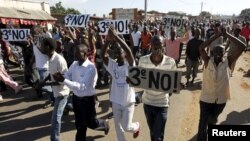Hundreds of people marched in the outskirts of Burundi's capital on Tuesday in a third day of protests against President Pierre Nkurunziza's decision to run for a third term, a move critics say violates the constitution and a key peace deal.
Crowds started gathering early in the morning, chanting: "We accepted the first term for Nkurunziza, we have also accepted the second one, but we will never accept the third one."
Nkurunziza's announcement on Saturday that he would run in the June 26 elections has triggered the worst political crisis in the east African country since it emerged from civil war a decade ago.
Activists say he is breaking two-term limits set out in constitution and the Arusha peace agreement that ended the war and has been credited with containing Burundi's ethnic rifts.
The president's supporters say his first term does not count as he was picked by lawmakers, not elected. Nkurunziza's spokesman has called the protests an "insurrection."
Burundi's civil war pitted the army, then dominated by the ethnic Tutsi minority, against rebel groups mostly made up of majority Hutus, one of them led by Nkurunziza. The army now includes both ethnic groups.
The prospect of a fresh build-up of ethnic strife will sound alarm bells across a region still scarred by the 1994 genocide in Burundi's neighbor Rwanda, where more than 800,000 people were killed, most of them Tutsis and moderate Hutus.
Authorities say more than 20,000 people have fled from Burundi to Rwanda, and thousands more over the border to the Democratic Republic of Congo.





